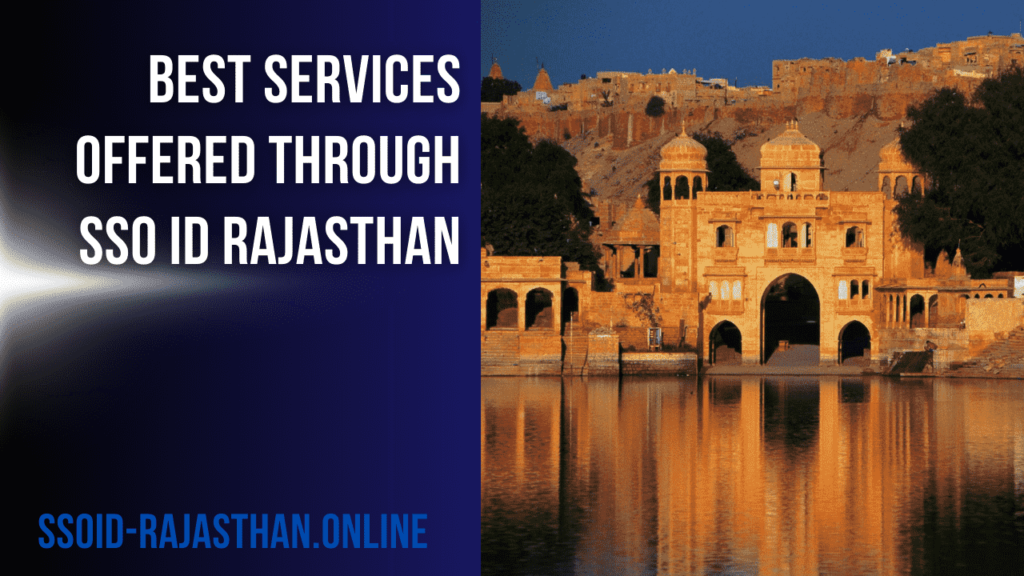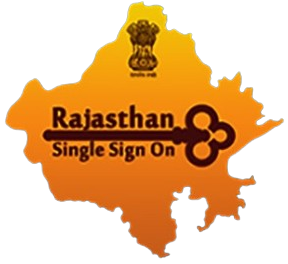In recent years, the Government of Rajasthan has made significant strides in digitalizing its services to enhance accessibility and efficiency for its citizens. At the forefront of this digital revolution is the Single Sign-On (SSO) ID Rajasthan platform, which serves as a unified gateway to a myriad of government services. This article delves into the various services offered through SSO ID Rajasthan, examining the key factors that influence their implementation, the challenges faced, and the overall impact on the state’s population.

Understanding About Services Offered through SSO ID Rajasthan
Before we explore the services in detail, it’s crucial to understand what SSO ID Rajasthan is and how it functions. SSO ID Rajasthan is a centralized authentication system that allows users to access multiple government services with a single set of login credentials. This system streamlines the process of accessing various e-governance services, eliminating the need for multiple usernames and passwords.
Key Services Offered on this Portal
1- E-Mitra Services
E-Mitra is one of the flagship initiatives integrated with SSO ID Rajasthan. It provides a one-stop solution for various government-to-citizen (G2C) and business-to-citizen (B2C) services. Through E-Mitra kiosks and the online portal, citizens can access services such as:
- Bill payments (electricity, water, telephone)
- Certificate issuance (birth, death, caste, income)
- License renewals
- Pension-related services
The integration of E-Mitra with SSO ID Rajasthan has significantly reduced the time and effort required to avail these services.
2- Bhamashah Yojana
The Bhamashah Yojana is a comprehensive financial inclusion and women empowerment initiative. Through SSO ID, users can access information about their Bhamashah accounts, update personal details, and avail of various benefits linked to the scheme.
3- RAJSSO
RAJSSO (Rajasthan Single Sign-On) provides access to a plethora of departmental applications, including those related to health, education, and social welfare. This integrated approach ensures that citizens can access diverse services without the need to navigate multiple websites or remember various login credentials.
4- Employment Services
Job seekers in Rajasthan can benefit from various employment-related services through the SSO ID platform. These include:
- Registration for employment exchanges
- Access to job notifications
- Skill development program registrations
- Career counseling services
By centralizing these services, the government aims to bridge the gap between job seekers and potential employers.
5- E-Learning and Education Portals
Students and educators can benefit from the educational services available through SSO ID. These include access to online learning platforms, digital libraries, and examination portals. The integration with education services helps streamline the academic process for students and institutions alike.
6- Health Services
The SSO ID platform also caters to healthcare needs by offering:
- Online appointment booking for government hospitals
- Access to medical records
- Telemedicine consultations
- Health insurance scheme registrations
These services have proven particularly valuable during the COVID-19 pandemic, ensuring continuity of healthcare services while minimizing physical contact.
7- Agriculture and Land Records
Farmers and landowners can access crucial services such as:
- Crop insurance applications
- Subsidy disbursements
- Land record verifications
- Soil health card services
By digitalizing these services, the government aims to empower farmers with timely information and support.
8- Business and Industry Services
Entrepreneurs and business owners can use SSO ID to access services related to business registration, licenses, and permits. This single-window approach simplifies the process of starting and managing a business in Rajasthan.
9- Transport Services
Transport services such as vehicle registration, driving license applications, and payment of road taxes are also integrated into the SSO ID platform. This integration ensures that citizens can manage all their transport-related needs efficiently.
Key Factors Impacting Service Delivery
Digital Literacy
The success of digital services heavily depends on the digital literacy of the population. While urban areas have shown higher adoption rates, rural regions face challenges due to limited digital skills.
Internet Connectivity
Reliable internet connectivity is crucial for accessing online services. The government has been working on improving internet infrastructure, but challenges persist in remote areas.
User Interface and Experience
The design and user-friendliness of the SSO ID platform play a significant role in service adoption. A well-designed interface can encourage more citizens to use digital services.
Data Security and Privacy
As more services go digital, ensuring the security and privacy of user data becomes paramount. The government must invest in robust cybersecurity measures to maintain public trust.
Integration with Legacy Systems
Many government departments still rely on legacy systems. Seamless integration of these systems with the SSO ID platform is crucial for efficient service delivery.
Challenges and Tradeoffs
Digital Divide
The most significant challenge is bridging the digital divide between urban and rural areas. While digital services offer convenience, they may inadvertently exclude those without access to technology or the internet.
Language Barriers
Rajasthan is a linguistically diverse state. Ensuring that services are available in local languages is crucial for wider adoption but can be resource-intensive.
Cybersecurity Risks
As more services go online, the risk of cyber attacks and data breaches increases. Balancing ease of access with robust security measures is an ongoing challenge.
Infrastructure Costs
Developing and maintaining the digital infrastructure required for SSO ID services involves significant costs. The government must balance these expenses with other developmental priorities.
Training and Support
Continuous training of government staff and providing support to citizens is essential for the success of digital services. This requires ongoing investment in human resources.
Tradeoffs in Balancing Different Factors
Security vs. Convenience
Implementing strong security measures, such as 2FA and regular password updates, enhances data protection but may add extra steps for users. Simplifying the login process can improve user convenience but might reduce security.
User Interface Complexity vs. Functionality
A simple interface is easier to use but might lack advanced features that some users require. Conversely, a feature-rich interface can be more complicated and overwhelming for users.
Accessibility vs. Performance
Ensuring that the SSO ID platform is accessible on various devices and browsers can sometimes compromise performance. Optimizing for performance might lead to compatibility issues for certain devices.
Importance of Considering Impact
User Satisfaction
A well-designed and efficient SSO ID system can significantly enhance user satisfaction by providing easy access to a wide range of services. Ensuring a positive user experience is crucial for the success of the platform.
Government Efficiency
Streamlined access to services can improve administrative efficiency and reduce the burden on government offices. It allows for better resource allocation and more effective service delivery.
Digital Inclusion
Ensuring that all citizens, regardless of their technical proficiency, can access and benefit from the SSO ID system is essential for promoting digital inclusion. Providing support and training can help achieve this goal.
Future Prospects and Considerations
Emerging Technologies
Incorporating emerging technologies like artificial intelligence and blockchain could further enhance service delivery and security.
Mobile-First Approach
With the increasing penetration of smartphones, adopting a mobile-first approach could significantly boost service accessibility.
Public-Private Partnerships
Collaborating with private sector entities could bring innovation and efficiency to service delivery while sharing the financial burden.
Continuous User Feedback
Regular feedback mechanisms and user surveys will be crucial for continual improvement of services.
Interoperability with National Platforms
Ensuring interoperability with national-level digital platforms like DigiLocker and UMANG will be essential for seamless service integration.
Conclusion
The Services Offered through SSO ID Rajasthan represent a significant step towards digital governance in the state. By providing a centralized platform for accessing a wide range of government services, it has the potential to transform the citizen-government relationship. However, the success of this initiative hinges on addressing key challenges such as the digital divide, cybersecurity, and continuous system improvements.
As Rajasthan continues to refine and expand its digital services, it’s crucial to maintain a balance between technological advancements and inclusivity. By focusing on user-centric design, robust security measures, and comprehensive digital literacy programs, the state can ensure that the benefits of SSO ID Rajasthan reach all segments of society.
The journey towards complete digital governance is ongoing, and the SSO ID Rajasthan platform serves as a model for other states to emulate. As technology continues to evolve, so too will the services offered, promising an ever-more connected and efficient future for the citizens of Rajasthan.
What is SSO ID Rajasthan and how does it work?
SSO ID Rajasthan is a centralized authentication system that allows users to access multiple government services with a single set of login credentials. This system streamlines the process of accessing various e-governance services, eliminating the need for multiple usernames and passwords. Once registered, users can log in to the SSO ID portal and access a wide array of services from different government departments.
How can I register for an SSO ID Rajasthan account?
Visit the official SSO Rajasthan website (sso.rajasthan.gov.in).
Click on the “Register” button.
Choose one of the available options to register (Jan Aadhaar, Bhamashah ID, Facebook, Google, or Twitter).
Fill in the required details and create a username and password.
Complete the registration process by verifying your details. Once registered, you can use these credentials to log in and access various government services.
What services can I access through SSO ID Rajasthan?
E-Mitra services (bill payments, certificate issuance, license renewals, etc.)
Employment-related services (job notifications, skill development programs, etc.)
Educational services (online admission, scholarship applications, results, etc.)
Healthcare services (online appointment booking, medical records access, telemedicine, etc.)
Agriculture and land records (crop insurance, subsidy disbursements, land verification, etc.)
Business and industry services (business registration, licenses, permits, etc.)
Transport services (vehicle registration, driving license applications, road tax payments, etc.)
What are the key challenges in using SSO ID Rajasthan?
Digital Divide: Ensuring accessibility for both urban and rural populations with varying levels of digital literacy.
Internet Connectivity: Reliable internet access is crucial for using online services, which can be problematic in remote areas.
Security and Privacy: Protecting user data and maintaining robust cybersecurity measures to prevent breaches.
Integration with Legacy Systems: Ensuring seamless integration of older government systems with the new digital platform.
Language Barriers: Providing services in multiple local languages to cater to the diverse linguistic population of Rajasthan.
How does SSO ID Rajasthan enhance government efficiency and user convenience?
SSO ID Rajasthan enhances government efficiency and user convenience by:
Centralized Access: Users can access multiple government services with a single login, reducing the need for multiple accounts and visits to various government offices.
Streamlined Processes: Digitalization of services speeds up administrative processes and reduces paperwork, leading to quicker service delivery.
Transparency and Accountability: Digital records increase transparency and reduce opportunities for corruption.
User Satisfaction: Providing easy access to services from home or local kiosks saves time and effort for citizens, improving their overall experience.
Data-Driven Decisions: The platform generates valuable data that helps the government make informed policy decisions and allocate resources more effectively.
